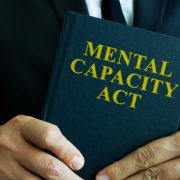
Mental Capacity Act 2005 to Make Decisions
With the rapidly changing social environment and the wide range of information available today, it has become difficult for people to make informed decisions. The lack of mental capacity is one of the major reasons why people fail to act appropriately in their daily lives. To advance people’s mental autonomy, the Mental Capacity Act 2005 (MCA) was passed by the Parliament of the United Kingdom of Great Britain and Northern Ireland in 2005.
It provides a framework that protects individuals who cannot make decisions. This blog will discuss what mental capacity is, some of its definitions, and how it affects decision-making in everyday life. We will also touch upon the Mental Capacity Code of Practice that the MCA court and its significance drafted.
Mental Capacity Act 2005

The Mental Capacity Act of 2005 provides a legal framework for the decision-making of adults aged 16 or over who cannot decide for themselves. The act is accompanied by a statutory code of practice that guides how it should be used.
The act introduces safeguards to protect people’s rights and interests when they cannot make decisions. This includes the rights of the person with the capacity to make a decision, the person with the capacity to be involved in the decision-making process and the person with the capacity to be given information about the decision.
The act also outlines steps to be taken if a person lacks capacity, and these steps outline best practices for decision-making. They include identifying whether someone has the capacity, getting medical or other relevant professional opinions, and considering advanced medical directives. The act also outlines what can be done if someone needs more capacity, but this is not obvious.
Some steps include seeking court approval for the decision, appointing a guardian or advocate, or engaging with a mental health services provider. The act outlines how to make decisions under the act and the definition of ‘mental capacity’.
It states that a person must have the capacity to make decisions if they can understand the information necessary to arrive at them, understand the outcomes of those decisions, and understand any consequences of their decisions. The act also outlines that mental capacity cannot be used to deny someone access to care or treatment if it is an emergency or no suitable care provider is available.
Mental Capacity Act Code of Practice
Anyone working with and caring for adults who may lack the capacity to make certain choices will benefit from the Code of Conduct. It defines their responsibilities when acting or making decisions on behalf of people who cannot act or make these choices themselves.
The Mental Capacity Act is a legal framework used to protect and empower people aged 16 and over who cannot decide for themselves. The act applies in England and Wales and covers decisions related to day-to-day activities, such as buying food or clothes, and life-changing tough decisions, such as medical treatment or entering a care home.
People who lack capacity can include those with a severe learning disability, a brain injury, a mental health illness, or unconsciousness caused by an anaesthetic or sudden accident or due to medical negligence. Under the MCA Code of Practice, individuals lacking capacity should be treated with respect and dignity.
Researchers working with participants who lack capacity should be aware of the action and its guidance. This helps ensure that individuals lacking capacity receive the protection and support they deserve.
Section 1 Mental Capacity Act

According to the terms of this attack, a person is deemed unable to decide for himself in relation to a subject because of an impairment of or disturbance in the functioning of his mind or brain at the material time.
The act outlines five core principles to be followed when caring for people with mental capacity issues. The principles include:
- Assuming capacity.
- Providing support.
- Respecting the person’s autonomy.
- Making best interests decisions and using the least-restrictive care method.
These principles aim to ensure that people with mental capacity issues are treated fairly and by their rights and freedoms.
If a decision is too big or complicated for a person, an appropriate best interests decision must be made on their behalf. In any decision-making process, healthcare professionals must consider the person’s interests, wishes, and best interests. The act also outlines procedures for making best interests decisions in healthcare settings such as hospitals and clinics.
Section 2 Mental Capacity Act
The Mental Capacity Act 2005 (MCA) is a legislation that applies in England and Wales. It outlines the principles and procedures for making decisions for adults who cannot make decisions for themselves. By the MCA, a person is assumed to have capacity unless it is established that they lack such capacity.
If someone lacks capacity, a court may decide if certain conditions are met on their behalf. However, the court must consider the person’s interests and mental capacity when deciding. The MCA safeguards vulnerable people by ensuring they receive appropriate treatment and care and safeguarding their rights and interests.
It also sets out the responsibilities of medical practitioners, mental health professionals, social workers, local authorities, other care providers, family members and others involved in the decision-making process for health and welfare. The attack ensures that anyone seeking to capacity-assess a person receives independent medical advice. This ensures the person is appropriately assessed for capacity based on medical information and not influenced by the opinions of family or friends.
In addition, by understanding the principles of lucid decision-making outlined in the attack, healthcare professionals can better support their clients to make informed decisions about their care.
Section 3 Mental Capacity Act

By section 2, a person can only decide if he comprehends, retains, weighs, or conveys the information necessary to make the decision. However, a person can comprehend an explanation of anything given to him in a fashion that is acceptable to his circumstances. In that case, that person is not to be assumed to be incapable of understanding the facts pertinent to a choice.
A person can still be considered capable of making a decision even if they can only remember information important to that decision for a limited time. Information about the reasonably foreseeable effects of choosing one course of action over another is included in the information relevant to a decision.
The MCA ensures that individuals can make decisions about vital aspects of their lives and are supported during vital decision-making processes when they lack capacity. It also helps protect the interests of people with mental capacity issues and others who may be affected by such decisions.
Section 4 Mental Capacity Act
Insofar as it is practical, a person must encourage the other person to engage as completely as possible in every action taken on his behalf and in any decision that impacts him.
If adults cannot decide, it must be made in their best interests. This means that the decision being made needs to be the ‘least restrictive’ option possible. This legal duty applies regardless of whether the person lacks mental capacity or not.
The act is accompanied by a statutory code of practice that guides how it should be used.
- If you suspect someone lacks mental capacity, you must act by the principles of the action
- Even if you doubt the person’s capacity to decide for themselves.
You must pay attention to the person’s lack of mental capacity and refrain from providing them with relevant information or support.
Section 5 Mental Capacity Act
This gives legal immunity from liability for any conduct undertaken to the care or treatment of another individual.
The act also covers decision-making in relation to court proceedings and any other matter affecting the person’s rights or interests. Finally, the attack defines mental capacity as the person’s ability to recognize the consequences of their actions, understand them, and make informed decisions about them.
Restraint is when someone uses or threatens force to restrict the liberty of movement. There are two conditions for using restraint – the person must reasonably believe it is necessary to prevent harm, and the decision must be taken in the best interests of the person lacking capacity.
In practice, mental health professionals can authorize a guardian to use restraint on behalf of a vulnerable person when necessary to prevent harm.
They should follow the steps outlined in a mental health treatment plan to assess whether a person lacks mental capacity and then make every effort to minimize restraint as much as possible.
Section 16 Mental Capacity Act

Section 16 is the power to make decisions and appoint duties. This section shall apply if a person lacks capacity concerning personal well-being, property, and financial department matters. The court may decide the issue or appoint a representative to decide it. This section grants the court certain powers, acting by this act and particularly considering both principles and best interests.
The court should consider the need of the person in question, the benefits to them of having a deputy, and the likely costs. A court ruling is preferable to having a deputy act as the decision-maker. The authority accorded to a deputy should be as restricted in scope and period as is reasonably possible under the circumstances.
The court will issue additional orders and directions and grant a deputy any necessary powers or assign him suitable duties to ensure the order or appointment made under the subsection is properly carried out. Without prejudice to section four, the court can make an order, give directions, or appoint on conditions they deem most advantageous for all parties involved, even if no one has requested it.
A court order can be altered or annulled by a subsequent one. The court may cancel the appointment of a deputy or alter their given authority if they,
- Broken the court’s trust by acting inappropriately or against its best interests.
- He intends to act in a manner that would go against authority or not be in his best interests.
Section 21a Mental Capacity Act
When a person is considered unable to choose where they should live and what care to receive, section 21A proceedings are instituted when a standard authorization (restricting a person’s liberty) is in place.
Section 44 Mental Capacity Act
On summary conviction, the offender may face a sentence of up to [F1the magistrates’ court general maximum] or a fine not exceeding the statutory maximum or both; on indictment, he may face a sentence of up to 5 years in prison.
Conclusion
To make mental capacity decisions, the court must act by the principles of capacity-based decision-making set out in the Mental Capacity Act 2005. The court’s role is to act as a third-party advocate for someone lacking capacity.
Suppose the person cannot make a decision and is not supported by evidence of capacity. In that case, a court can challenge the decision, and the person may be found to lack capacity. However, a court acting in good faith cannot act contrary to mental capacity principles. Mental capacity decisions can only be overturned if they are proven wrong on facts or law.
FAQ – Mental Capacity Act 2005

What Are the Main Points of the Mental Capacity Act 2005?
The Mental Capacity Act 2005 (MCA) is a comprehensive framework that applies to adults aged 16 and over in England and Wales who are unable to make decisions for themselves. The act says that,
Every adult has the right to make their own choices as far as possible, regardless of their condition. People should always support people if they can make their own decisions.
What Are the 5 Principles of the Mental Health Act?
The 5 Principles of the Mental Health Act are as follows:
- An assumption of competence.
- The right to assistance in decision-making.
- A bad choice cannot be viewed as a bad choice.
- All decisions must be made with the public’s best interests in mind.
- Any involvement needs to be as unrestricted as feasible.
What Are 2 Key Purposes of the Mental Capacity Act?
The two main purposes of the Mental Capacity Act are to ensure that adults aged 16 and over who lack capacity can make decisions for themselves in their best interest and to provide support for them in making these decisions.
The first part of the test is to determine if a person has the capacity, which can be done through a mental examination. If a person lacks capacity, the decision-making process must be transferred to another person (or group). This person or group is responsible for deciding the best interest of the individual lacking capacity.
The second part of the act is to provide as much support as possible to help the person make a decision. This includes providing information, reassurance, and guidance. The act also protects the right of a person to make a decision even if others think it is unwise or if the decision is too big or complicated for them to make.
What is the 3 Month Rule Mental Health Act?
The three-month rule is a provision within the Mental Health Act (MHA) 1983, allowing someone to be detained in a hospital for assessment and treatment for up to three months. This rule means that even if individuals have the mental capacity to make decisions, they can still be treated against their will.
Who Decides if Someone Has Mental Capacity?
Mental capacity is assessed by a two-stage test, which determines if there is an impairment or disturbance in the functioning of the mind or brain. This is determined by considering if the person can understand the relevant information, retain it, weigh it, and communicate a decision. If the person meets all these criteria, mental capacity can be impaired or disturbed.
Suppose the person lacks capacity due to mental illness, learning disability, brain damage, intoxication, or any other condition causing confusion, drowsiness or loss of consciousness. In that case, they will not be able to pass the first stage of the mental capacity test. In these cases, a court may appoint a guardian or advocate to decide on their behalf.
What Are the 3 Elements of Capacity Test?
The 3 elements of the Capacity Test in the Mental Capacity Act 2005 are: understanding, retaining and using information.
Understanding requires the capacity to comprehend the decision that needs to be made and its implications. Retaining requires the capacity to remember the information relevant to the decision. Finally, using requires the capacity to weigh the information, consider the options available and make an informed decision.
All decisions must be made in the best interests of the person lacking capacity.
What Are the 4 Steps of Establishing Capacity?
If you’re in the medical profession and need to decide about a person’s capacity, the Mental Capacity Act of 2005 (MCA) provides a clear framework. Capacity is determined by a person’s ability to understand and decide when it needs to be made. This can be tricky to assess, but a professional should use the Code of Practice as guidance.
The MCA outlines four steps that must be followed when establishing capacity:
- The person must be informed of their right to have capacity assessed
- The person must be allowed to be heard
- The person must be allowed to have independent representation
- The decision-maker must act in the best interests of the person involved
What is Section 5 Mental Capacity?
Section 5 of the Mental Capacity Act 2005 allows adults aged 16 and over, unable to make decisions for themselves and lacking capacity, to be represented by someone else. This person is typically a family member or friend but can also be a professional guardian appointed by the court.
The Code of Practice guides how the act should be used. It specifies that decision-making under Section 5 should focus on the person’s best interests and consider their wishes and beliefs. The attack ensures that people who cannot decide about their care and treatment are protected and empowered.
What is Section 7 Mental Capacity Act?
Section 7 of the Mental Capacity Act 2005 (MCA) provides a comprehensive framework for decision-making for adults aged 16 and over who cannot make decisions for themselves. Generally, this means every adult has the right to make decisions wherever possible.
However, if a decision is too big or complicated for a person to make on their own, then people supporting them must make a best interests decision. This best interests decision should consider the person’s wishes, feelings, interests, needs, and the rights of others involved.





